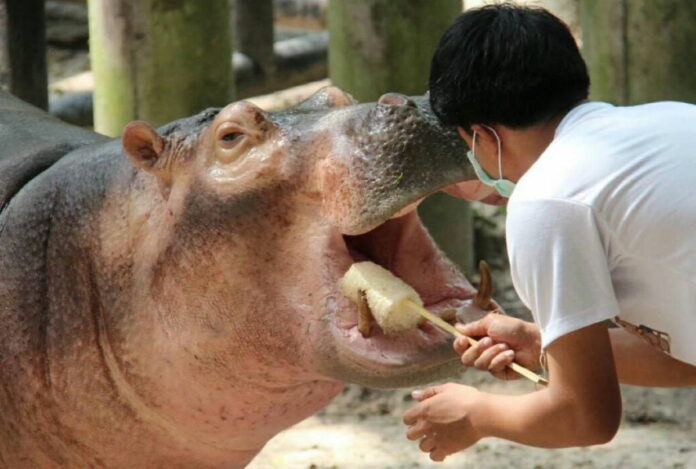“I set a goal to make her famous,” said zookeeper Atthapon Nundee about the baby pygmy hippo Moo-Deng in Chonburi, Thailand.
The two-month-old pygmy hippo went viral across Thailand and beyond after videos of her adorable behaviour were shared on social media.
Baby pygmy hippo becomes famous
Moo-Deng´s fame originated from a TikTok account with 2,5 million followers, dedicated to hippos and other animals at the Khao Kheow Open Zoo in Chonburi, Thailand. Atthapon Nundee, working at the zoo revealed to the Press; “The moment I saw Moo-Deng born, I set a goal to make her famous, but I never expected it would spread abroad. I thought she could be famous in Thailand but not internationally.”
It was the pygmy hippo´s cartoonish rosy cheeks and bright eyes that sparked her fame; fans have been making cakes and artworks in her image, delighted by her adorable features. One cosmetics chain even began encouraging social media users to “wear your blush like a baby hippo,” in posts promoting pink and peach-toned products.
Moo-Deng caught the attention of Time Magazine, who called her an “icon,” and “legend,” on their website, declaring, “She is the moment.” The animal´s fame was also prompted by tourists sharing videos of Moo-Deng on social media, which, however, raised concerns over her well-being, as tourists were accused of throwing water and seashells at Moo-Deng to wake her up to take photos.
The zoo authorities have condemned these tourists and Atthapon emphasised that CCTV has been installed and an officer had been assigned to watch over her.
Baby pygmy hippo one of the endangered species
Listed as an endangered species on the IUCN Red List, a 1993 study revealed that there were between 2,000 to 2,500 pygmy hippos remaining in the wild. Native to West Africa, where they live in swamps and near rivers, the species have been under the threat of habitat loss due to humans logging, mining, and hunting.
Atthapon highlighted to the Press that the zoo keeps Moo-Deng and other animals as close to nature as possible and contributes greatly to conserving the species; “I hope that the cuteness of Moo-Deng will raise awareness for people to come and learn about (the species).”
Founder of Wildlife Friends Foundation Thailand, Edwin Wiek, however, questioned the need for more pygmy hippos to be kept in zoos; “They are very endangered, but actually, with the proper enforcement and conservation plan in the wild – leave them alone, they can do really well.”
Should the baby pygmy hippo be kept at a zoo?
The ethical debate over zoos has been rising over the past few years, with zoos being essentially for-profit enterprises to maximize revenue; this has been deemed as rather careless behaviour by many animal activists who argue that zoos function for humans, not for animals, and are highly flawed as institutions.
Being bombarded by sounds, smells, and appearances of crowds, many animals are triggered with stress hormones at zoos and struggle to live in limited spaces. These unnatural environments can directly affect the behaviour of animals, most notably in what´s known as “stereotypy;” a condition in which animals engage in repetitive behaviours without purpose, such as pacing or picking their fur; a case of “zoochosis.”
However, zoos do play a part in conserving wildlife, recovering endangered species, and keeping them in controlled and safe environments, as well as allowing scientists to research animals´ behaviours, hence learning about how to improve their well-being. With zoos, people are also able to educate themselves on the different species in the ecosystem and build a connection with the wildlife, developing an appreciation for animals.


